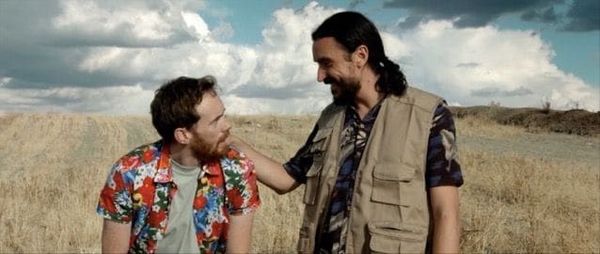 |
| Dani Perez Prada in David Paraja in Cuenta Con Nosotros |
Of the 250 films screened by the Festival International de Cine de Gijón this November, more than 60 were shorts threaded throughout the programme. Within this supportive space for short films there were two 'Nights of Spanish shorts' (fiction and animation) but also the Día d'Asturias section, which focused specifically on the work of filmmakers with ties to the Asturian region.
Twelve of the 20 Asturian shorts were shown in competition. A commonality among the competition group were characters who were looking to escape a situation or defined space - in Varadero (Benjamín Villaverde, 2015), a woman hemmed in by family responsibilities and lack of money dreams of moving to Cuba, while in Fame (Pablo A Neila, 2014) a priest in a rural backwater longs for a return to the life (and food) of the big city. Elsewhere, a daughter wants to move her dying mother to a place of happy memories in Where The Leaves Fall (Donde Caen las Hojas) (Alicia Albares, 2015) and a man wanders the streets to avoid being arrested for murder in Floating Melon (Fu Guo) (Roberto F Canuto and Xu Xiaoxi, 2015).
 |
| Hijas |
Sometimes people are trying to escape the past. In Hijas (Kiko Prada and Javier Prada, 2015), sisters Daniela (Macarena Gómez) and Raquel (Violeta Orgaz) reminisce about their parents and consider their futures following the death of their father. What begins with the appearance of supportive and caring sisterhood - Daniela has prepared a meal for Raquel (the latter has a broken arm) - takes a tragicomic turn as sibling rivalries surface. Shot in a crisp black and white and following a shot/reverse shot pattern of close-ups as the two women converse, it's a story told as much through minute facial gestures - the quirk of an eyebrow, a twitch of a mouth - as what they say, at least until smiles can no longer disguise the venom of long-festering discord. Hijas (which translates as 'Daughters' - an indication that their relationship with each other is defined by their respective relationships with their late father) particularly needs to be seen for the hyper expressive Gómez telling a tale of gangrene and amputation with barely contained relish.
The past - and memories of childhood - also dog the protagonist of Alice (Returns) (Alicia (De Vuelta)) (Daniel Vázquez, 2015). A disillusioned and adult Alice (of Wonderland fame) (Laura Domínguez) wanders a black and white land in an apparently immortal state - "Half an hour in Wonderland but 150 years in this shitty world" - but resists the call to return to the scene of her past exploits when she finds herself in a biker bar (and in colour) in a rabbit hole at the foot of a tree. The white-haired bartender (wearing a biker-style waistcoat embroidered with 'The White Rabbits') implores her to hurry because she's going to be late but Alice sits resolutely at the bar, downing one drink after another - but finding only temporary oblivion rather than changing size. We hear her internal thoughts (against a backdrop of ticking clocks) as self doubt sets in and she questions her grasp of reality - Is she the real Alice? Is thinking herself special just a delusion? Is her current disastrous state simply due to the limits of her imagination? - and the film uses her fractured psyche to suggest that childhood experiences like those undergone by Lewis Carroll's heroine would mark a person for life. This Alice is a survivor, even if she is doomed to repeat herself.
 |
| Alice (Returns) |
In the film that won the competition - Cuenta Con Nosotros (Pablo Vara, 2015) - it is not the past but the here-and-now from which the protagonists need to rapidly extricate themselves. A pair of writer-directors – David (David Pareja) and Dani (Dani Pérez Prada) – who specialise in comedy are looking for a story due to David's writer's block. They are approached by Tino (Manuel Pizarro), a retiree who wants them to participate in some form of vaguely-defined ‘cultural activities’ for no fee. Initially reluctant, Dani is nonetheless roped in by David’s (not entirely altruistic) enthusiasm and they agree to meet Tino in the countryside to help him make a short film. But when they arrive, things are not as they assumed them to be… to reveal any further details would spoil one of the biggest laughs, but suffice to say that they have landed themselves in tricky situation. Will David’s gift of the gab rescue them, or will he just get them into further trouble? What evolves is visually akin to a reimagining of the Western - director Pablo Vara uses widescreen to frame the dusty vistas as David and Dani square up to the challenge, and employs a combination of silence, exaggerated diegetic sound, and music to further emphasise the feel of that genre - but it is undercut by the incongruity (and comedy) of the actual situation. A well-made film and a breezy, laugh-out-loud delight.
This small selection of films demonstrates the variety of productions being made in Asturias, a region of little renown overseas in terms of its films - certainly not in comparison to the likes of Catalonia or the Basque Country, or neighbouring Galicia - but the names mentioned above are worth seeking out as their films travel and put the region on the cinematic map.
























